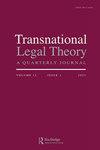Placed in between: the natural environment in international law
Q2 Social Sciences
引用次数: 1
Abstract
ABSTRACT How does international law conceptualize the natural environment? What and whose premises and interests inform this conceptualization? Can its depletion, destruction and change be linked to law? Sigrid Boysen's monograph, Die postkoloniale Konstellation: Natürliche Ressourcen und das Völkerrecht der Moderne grapples with these and other questions. The book argues that colonial and capitalist expansion's disregard for planetary boundaries co-constituted the fields of modern international economic and environmental law and triggered the transnationalization of law. Boysen convincingly narrates a genealogy of ideas from imperial relations to the natural environment in the colonies all the way to the recent legal developments in the field of climate change and shows how law has consistently upheld ambivalent human-nature relations, understanding nature as a commodity and object to be civilized and rescued from the uncivilized. This review essay reflects on some of the book's central messages and propositions.介于两者之间:国际法中的自然环境
摘要:国际法是如何对自然环境进行概念化的?什么以及谁的前提和兴趣为这种概念化提供了信息?它的消耗、破坏和变化能与法律联系起来吗?西格丽德·博伊森(Sigrid Boysen)的专著《后殖民时代:国家资源与现代史》(Die postkoloniale Konstellation:Natürliche Ressourcen und das Völkerrecht der Moderne)探讨了这些问题和其他问题。该书认为,殖民主义和资本主义扩张对地球边界的漠视共同构成了现代国际经济和环境法的领域,并引发了法律的跨国化。博伊森令人信服地讲述了从帝国关系到殖民地自然环境,再到气候变化领域最近的法律发展的思想谱系,并展示了法律如何始终如一地维护矛盾的人性关系,将自然理解为一种商品和对象,以实现文明并从未文明中拯救出来。这篇评论文章反映了这本书的一些核心信息和主张。
本文章由计算机程序翻译,如有差异,请以英文原文为准。
求助全文
约1分钟内获得全文
求助全文
来源期刊

Transnational Legal Theory
Social Sciences-Law
CiteScore
2.10
自引率
0.00%
发文量
7
期刊介绍:
The objective of Transnational Legal Theory is to publish high-quality theoretical scholarship that addresses transnational dimensions of law and legal dimensions of transnational fields and activity. Central to Transnational Legal Theory''s mandate is publication of work that explores whether and how transnational contexts, forces and ideations affect debates within existing traditions or schools of legal thought. Similarly, the journal aspires to encourage scholars debating general theories about law to consider the relevance of transnational contexts and dimensions for their work. With respect to particular jurisprudence, the journal welcomes not only submissions that involve theoretical explorations of fields commonly constructed as transnational in nature (such as commercial law, maritime law, or cyberlaw) but also explorations of transnational aspects of fields less commonly understood in this way (for example, criminal law, family law, company law, tort law, evidence law, and so on). Submissions of work exploring process-oriented approaches to law as transnational (from transjurisdictional litigation to delocalized arbitration to multi-level governance) are also encouraged. Equally central to Transnational Legal Theory''s mandate is theoretical work that explores fresh (or revived) understandings of international law and comparative law ''beyond the state'' (and the interstate). The journal has a special interest in submissions that explore the interfaces, intersections, and mutual embeddedness of public international law, private international law, and comparative law, notably in terms of whether such inter-relationships are reshaping these sub-disciplines in directions that are, in important respects, transnational in nature.
 求助内容:
求助内容: 应助结果提醒方式:
应助结果提醒方式:


